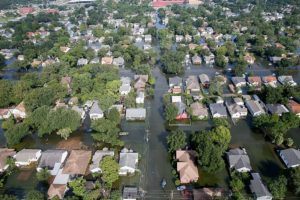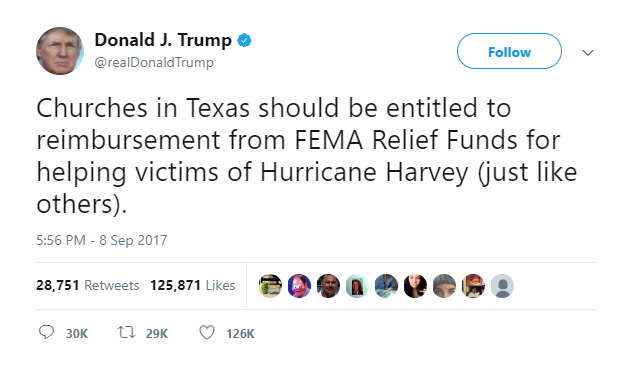Urgent Need or Religious Exceptionalism? Texas Churches Sue FEMA for Reimbursement
 Flooding in Port Arthur, TX on August 31, 2017. (via)
Flooding in Port Arthur, TX on August 31, 2017. (via) Three Texas churches are suing the Federal Emergency Management Agency (FEMA) for excluding them from public assistance after they aided the community during Hurricane Harvey. The conservative non-profit law firm the Becket Fund (notorious for challenging FEMA’s policy on churches) is representing Harvest Family Church, Hi-Way Tabernacle, and Rockport First Assembly of God in the US District Court for the Southern District of Texas.
The lawsuit claims that all three churches were damaged during Harvey—losing, among other things, a steeple, roof, and van, and experiencing heavy flooding. One church, Hi-Way Tabernacle, agreed to serve as a shelter and food distributor. The lawsuit argues that under these circumstances, it is unfair for FEMA to exclude houses of worship from access to disaster relief funds and requests that FEMA’s policy be deemed unconstitutional.
The lawsuit is the first of its kind to cite the recent Supreme Court decision in Trinity Lutheran Church of Columbia, Inc. v. Comer. The Supreme Court held that the Missouri Department of Natural Resources’ refusal to give money to Trinity to resurface a playground at its learning center violated its freedom to exercise its religion. The activities at the Trinity learning center were explicitly described as teaching “a Christian world view to children of members of the Church, as well as children of non-member residents.”
The court came to the astounding conclusion that requiring the government to consider religious institutions for publicly funded programs does not violate the Establishment Clause. And now, as expected, religious institutions and conservative organizations like Becket are testing the limits of this decision. Disappointing as the Supreme Court’s ruling is, the ruling did include a footnote that states: “This case involves express discrimination based on religious identity with respect to playground resurfacing. We do not address religious uses of funding or other forms of discrimination,” meaning if this footnote rules, this decision is only valid in cases specifically involving playground renovations.
Paul Capehart, the pastor of Harvest Family Church, said in a statement: “Our faith is what drives us to help others. Faith certainly doesn’t keep us from helping others, and we’re not sure why it keeps FEMA from helping us.” And the president agrees. Trump publicly supported the lawsuit’s claims in a tweet on September 8:

While churches providing assistance to their communities during a disaster is commendable, frankly, it is unrelated. US taxpayers are not responsible for the actions of a church, and should not be held hostage for their decisions, as intended by this lawsuit. To quote the Bible, “That by working hard in this way we must help the weak and remember the words of the Lord Jesus, how he himself said, ‘It is more blessed to give than to receive.’” A church expecting to receive benefits from public services to repair property—services that they do not pay into, is a clear example of religious exceptionalism.
The push for FEMA to provide federal aid to churches isn’t new. After Hurricane Katrina in 2005 the Bush administration, in the wake of its disastrous response, agreed to reimburse churches and other religious organizations that provided shelter and supplies to survivors. Like Bush, Trump could order FEMA to direct taxpayer funds, which could be used to rebuild essential infrastructure, to pay these churches to restore their steeples, purchase a new van, and remove mold from flooding so they don’t have to tap into their untaxed budgets (that don’t need to be reported to the government).
Perhaps we should be looking to the US Constitution for the answer to why FEMA originally declined to send money to these churches, and why it would be problematic for them to do so even under the orders of the president. FEMA’s primary purpose is to provide urgent and essential assistance when a disaster has occurred that overwhelms the resources of state and local governments. Already spread thin, they provide funding for rebuilding efforts and training, consultants, and emergency response crews, while other needs are referred to the Small Business Administration.
As a government entity that’s funding originates from federal taxes, FEMA does not supply grants to houses of worship that spend more than half their time and resources promoting religious activities, services, or internal fundraising. To do so would be a violation of the Establishment Clause that lays the foundations for the separation of church and state and it would be a misuse of taxpayer money. As a secular nation, we have the responsibility to ensure that the government obstructs no religion (as long as it does not violate rights) and endorses no religion. So long as church-state separation is maintained in our Constitution, it is essential that FEMA focuses resources on essential and urgent needs of communities affected by devastating disasters, not buy a church a new van.
